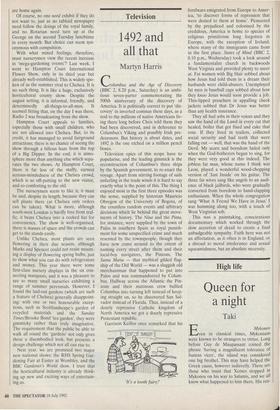Television
1492 and all that
Martyn Harris
Columbus and the Age of Discovery (BBC 2, 8.20 p.m., Saturday) is an ambi- tious seven-parter commemorating the 500th anniversary of the discovery of America. It is politically correct to put 'dis- covery' in inverted commas these days, as a nod to the millions of native Americans liv- ing there long before Chris told them they had been discovered, and in deference to Columbus's Viking and possibly Irish pre- decessors. But history is about dates, and 1492 is the one etched on a million pencil boxes.
Television epics of this scope have to popularise, and the leading gimmick is the reconstruction of Columbus's three ships by the Spanish government, to re-enact the voyage. Apart from stirring footage of sails unfurling in the trade winds it is hard to say exactly what is the point of this. The thing I enjoyed most in the first three episodes was the sense, supplied by historian Mauricio Obregon of the University of Bogota, of the countless random events and arbitrary decisions which lie behind the great move- ments of history. The Nina and the Pinta, for instance, were supplied by the town of Palos in southern Spain as royal punish- ment for some unspecified crime and much resented by the townspeople, though they have now come around to the extent of naming every street after them and their local-boy navigators, the Pinzons. The Santa Maria — that mythical gilded flag- ship of the Old World — was a sluggish old merchantman that happened to put into Palos and was commandeered by Colum- bus. Halfway across the Atlantic the Pin- zons and their mutinous crew bullied Columbus into turning left instead of keep- ing straight on, so he discovered San Sal- vador instead of Florida. Thus, instead of a dourly repressive Catholic kingdom of North America we got a dourly repressive Protestant republic.
Garrison Keillor once remarked that his
'It's a tooth fairy!' forebears emigrated from Europe to Amer- ica, 'to discover forms of repression that were denied to them at home'. Pioneered by the prejudiced and colonised by the credulous, America is home to species of religious primitivism long forgotten in Europe, with the exception of Ireland, where many of the immigrants came from in the first place. States of Mind (BBC 2, 8.10 p.m., Wednesday) took a look around a fundamentalist church in backwoods West Virginia and provided plenty to sneer at. Fat women with Big Hair sobbed about how Jesus had told them in a dream their husbands were child-abusers. Unemployed fat men in baseball caps sobbed about how they knoo Jesus would soon provide a job. Thin-lipped preachers in appalling check jackets sobbed that Dr Jesus was better than any health insurance.
They all had sobs in their voices and they saw the hand of the Lawd in every cut that healed, boiler that got fixed and cake that rose. If they lived in trailers, collected social security and had teeth that were falling out — well, that was the hand of the Devil. My scorn and boredom faded only when the God-botherers began to sing, for they were very good at this indeed. The jobless fat man, whose name I think was Leon, played a wonderful wood-chopping version of 'Just Inside' on his guitar. The three fat wives sang like angels to an audi- ence of black jailbirds, who were gradually converted from boredom to hand-clapping enthusiasm. When the whole congregation sang 'What A Friend We Have in Jesus' I was humming along too, with a touch of West Virginian sob.
This was a painstaking, conscientious documentary which worked through the slow accretion of detail to create a final unbudgeable sympathy. Faith here was not an affectation, as it often is in England, or a shroud to moral intolerance and sexual squeamishness, but an absolute necessity.


















































 Previous page
Previous page